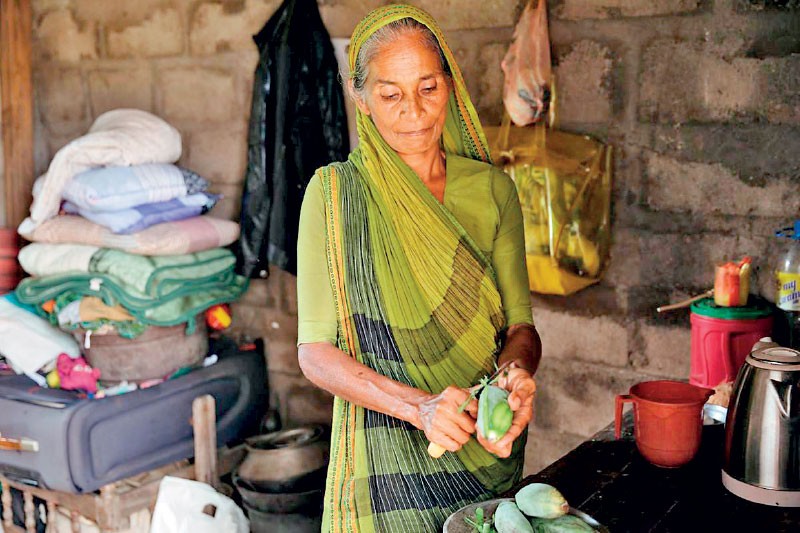Thursday Feb 19, 2026
Thursday Feb 19, 2026
Thursday, 25 September 2025 00:02 - - {{hitsCtrl.values.hits}}

Zakath is designed not merely to relieve poverty temporarily but to eradicate it by creating economic balance and social solidarity
 Modern business enterprises are scientific, complex, and competitive. No project can succeed without rigorous planning — including feasibility studies, project appraisals, business models, and risk management strategies. Although zakath administrators and volunteers dedicate themselves selflessly, most lack the technical expertise required for such tasks. Many are unfamiliar with the importance of professional assessments, while others are hesitant to allocate funds for preliminary studies, considering them “wasteful.” This approach, however, contradicts both reason and revelation
Modern business enterprises are scientific, complex, and competitive. No project can succeed without rigorous planning — including feasibility studies, project appraisals, business models, and risk management strategies. Although zakath administrators and volunteers dedicate themselves selflessly, most lack the technical expertise required for such tasks. Many are unfamiliar with the importance of professional assessments, while others are hesitant to allocate funds for preliminary studies, considering them “wasteful.” This approach, however, contradicts both reason and revelation
 Zakath (micro finance of a minority Muslim community) is not merely an act of charity but a system meant to eradicate poverty and strengthen social justice. In Sri Lanka, however, its potential remains underutilised due to a consumption-heavy approach and lack of sustainable strategies. Unless zakath distribution evolves from relief to empowerment, Muslims will continue to face the painful irony of widespread poverty, which is said to be three times higher than the national average.
Zakath (micro finance of a minority Muslim community) is not merely an act of charity but a system meant to eradicate poverty and strengthen social justice. In Sri Lanka, however, its potential remains underutilised due to a consumption-heavy approach and lack of sustainable strategies. Unless zakath distribution evolves from relief to empowerment, Muslims will continue to face the painful irony of widespread poverty, which is said to be three times higher than the national average.
Why this article now?
In Sri Lanka, zakath is too often spoken of only during Ramazan, when most Muslims rush to fulfil their duty and then let the dialog fade away for another year. Yet, zakath was never meant to be a passing ritual; it is a social justice and a lifeline for the poor. If practiced with vision and commitment, it can become a powerful force that uplifts families, restores dignity, and transforms entire communities.
By raising this call now, I hope to awaken zakath payers, administrators and other stakeholders for a continuous dialogue — one that sees zakath not as a seasonal obligation, but as a year-round mission of justice and compassion.
Muslims and poverty in Sri Lanka
According to the International Poverty Index, an individual earning less than Rs. 645 ($ 2.15) per day is considered to be living below the poverty line. Accordingly, a family of five requires a minimum monthly income of Rs. 96,750 to remain above the poverty threshold.
Based on international data, when examining the economic condition of Sri Lankan Muslims, the question arises: out of roughly 500,000 Muslim families, how many actually earn more than Rs. 96,750 per month? My observation is that well over 75% of the Muslim community continues to live below the poverty line.
When viewed against national statistics, the picture becomes even more concerning. According to 2024 data, Sri Lanka’s per capita income stands at Rs. 1,296,000 ($ 4,320) per year. For a family of five, this translates into an average monthly household income of Rs. 540,000. Readers may judge for themselves how many Muslim families actually reach this benchmark. In my assessment, fewer than 10% of all Muslim households fall into this category.
This article does not attempt to revisit the usual questions—such as what zakath means, which items are subject to it, what is exempt, or what rates apply. Those matters have been discussed in depth for centuries.
Instead, the focus here is on why zakath has not lived up to its true potential. The greater irony is that while Muslims are often seen as a business community, the large sums collected in the name of zakath have brought little lasting change.
Concept of zakath in nutshell
Zakath is a mandatory financial obligation in Islam, required of Muslims whose annual wealth or periodic agricultural produce exceeds the prescribed threshold. This threshold is measured as the equivalent of 84 grams of pure gold for wealth, and 647 kilograms of rice for agricultural produce. Accordingly, it is obvious that it is the wealth tax calculated –with few changes – on the basis of net assets of a balance sheet rather than on income basis.
What do we mean by poverty?
Poverty, in its simplest form, is the lack of means to meet basic material needs. It is generally classified into two categories:
Zakath: The Islamic mechanism
The Qur’an underscores its importance more than 30 times, as in:
“Take from their wealth charity by which you may cleanse them and purify them, and invoke blessings upon them.” (Qur’an 9:103)
The Prophet (pbuh) emphasised both its spiritual and social dimensions, warning that hoarded wealth would become a torment in the Hereafter and encouraging prompt charity as a shield against calamity.
In short, zakath is designed not merely to relieve poverty temporarily but to eradicate it by creating economic balance and social solidarity.
The Sri Lankan paradox
Despite the significant sums of zakath disbursed — estimated at over Rs. 1 billion annually — poverty among Sri Lankan Muslims remains disproportionately high. Why has zakath fallen short of its mission and objective?
The main reason – as I see – for the dismal performance of zakath in Sri Lanka lies in its distribution mechanism:
The outcome of such inefficient zakath distribution provides temporary relief rather than long-term empowerment and creates a dependency culture, leaving poverty levels largely unchanged.
Rethinking zakath distribution
For zakath to fulfil its true purpose, a shift in approach is necessary. The holy Quran emphasises this paradigm shift as follows:
“Indeed, Allah will not change the condition of a people until they change what is in themselves (mentality and attitude).” (Qur’an 13:11)
The fact that a zakath institution is governed by pious and senior citizens, shall not of itself ensure the efficiency or success of the zakath or its institution. Proper plan, knowledge and strategy are too fundamentally important for success of such zakath mechanism.
Why zakath investments often fail
The noble intention of using zakath for income-generating projects often ends in disappointment. Despite goodwill, many initiatives fail to produce sustainable results. The reasons for this can be traced to three essential elements of any successful business venture:
1.Proper planning and decision-making
Modern business enterprises are scientific, complex, and competitive. No project can succeed without rigorous planning — including feasibility studies, project appraisals, business models, and risk management strategies.
Although zakath administrators and volunteers dedicate themselves selflessly, most lack the technical expertise required for such tasks. Many are unfamiliar with the importance of professional assessments, while others are hesitant to allocate funds for preliminary studies, considering them “wasteful.”
This approach, however, contradicts both reason and revelation. The Qur’an itself commands:
“So ask those who possess knowledge if you do not know.” (Qur’an 16:43)
Incorporating professionals — economists, financial analysts, industry experts — is not optional but indispensable. Their services must be regarded as an investment, not an expense. Zakath funds set aside for Aamileen (administrators), one of the eight Qur’anic categories of Zakath, can justifiably cover such costs.
2.Adequate capital
Another major weakness is the “scattergun” approach: dividing available funds into small shares so that as many recipients as possible are included. While this satisfies the desire to maximise the number of beneficiaries, it leaves each recipient with insufficient capital to launch or sustain a viable business. In effect, everyone receives something, but no one receives enough.
Instead, zakath institutions should allocate capital according to project requirements as determined by professional evaluations. Quality must be prioritised over sheer quantity.
A promising approach –in event of insufficiency of the capital – is to establish joint business ventures through collective zakath funding:
At the end of each financial year, profits would be distributed as dividends among the poor shareholders. This ensures they are not just passive recipients but genuine participants in wealth creation.
3.Efficient management
Even with sound planning and adequate capital, businesses fail without competent management. Many zakath-funded ventures collapse because recipients lack the necessary skills in production, human resources, marketing, and financial control.
The Qur’an advises against entrusting wealth to those unable to manage it:
“And do not give the weak-minded your property, which Allah has made a means of sustenance for you. Provide for them from it, clothe them, and speak to them with kind words.” (Qur’an 4:5)
This verse underscores the Islamic concept of wealth as a trust (amanah). Ultimately, Allah is the true owner of wealth, while humans are its caretakers. As trustees, zakath administrators must ensure wealth is managed effectively for the collective good.
The most appropriate mechanism is a Board of Directors comprised of:
These directors should be compensated at competitive market rates to ensure commitment and quality.
In parallel, some of the zakath-recipient shareholders (Fuqara and Masakeen) can be recruited as employees of the enterprise. Thus, they benefit not only from annual dividends but also from regular salaries, enabling them to climb steadily out of poverty. Over time, these recipients can transform from being zakath beneficiaries into zakath payers themselves — the very objective of the zakath institution.
Vision for the future
The Prophet Muhammad (peace be upon him) foretold a time of such prosperity:
“The Hour (Day of Judgment) will not be established until wealth increases so much that a man will be concerned as to whom he should pay his Zakath, and when he offers it, the one approached will reply: ‘I do not need it.’” (Bukhari, Vol. 2, Hadith 493)
This vision is not unattainable. With proper planning, adequate capital, and professional management, zakath can transform from a tool of temporary relief into a mechanism of lasting empowerment — alleviating poverty and elevating the community toward self-reliance and dignity.
(The writer is a retired Deputy Commissioner General of IRD. He can be reached at [email protected].)